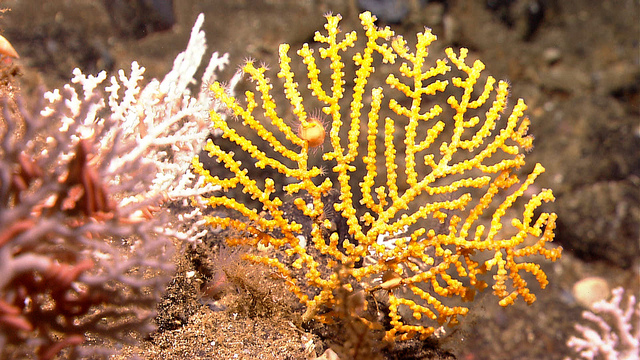 Earth & Space
Earth & Space
Ocean acidification and its effects on coral reef growth

Aptly named "Rainforests of the Sea", tropical coral reefs are one of the most biodiverse ecosystems on the planet. Much like how trees of a forest provide shelter for plants and animals living within, corals reefs provide food and shelter for millions of species ranging from microscopic bacteria to predatory sharks. Not only do coral reefs harbor vast ecological wealth, but they also provide us with ecosystem services valued at over $300 billion each year by supporting tourism, fishing, and protecting our coastlines by absorbing wave energy.
Unfortunately, coral reef health is in decline worldwide (read also the Break: The silent battle of young corals against ocean acidification). Reefs are currently challenged by a variety of threats ranging from local factors like pollution and overfishing to global-scale issues like climate change and ocean acidification. Ocean acidification threatens many marine organisms, particularly calcifiers like oysters, crabs, and corals - this is because changing seawater chemistry interferes with calcification, the process by which organisms build protective shells or skeletons. Coral reefs are widely regarded as one of the most vulnerable ecosystems to ocean acidification, in part because the very architecture of the ecosystem relies on calcifying organisms. Through calcification many corals build the spectacular, beautiful, and protective calcium carbonate skeletons that form reefs. Without coral calcification, there are no reefs, and without reefs, there is no food or shelter for the millions of associated species.
Much of the attention surrounding coral reefs and ocean acidification has focused on future implications - what does ocean acidification mean for the future of coral reefs? Will changing seawater chemistry cause reefs to stop growing altogether? These are important questions that are being addressed through ongoing laboratory and field studies. However, the chemistry of the oceans has already changed. Since the pre-industrial revolution (circa 1880), the oceans have absorbed ~25% of the extra carbon dioxide humans injected into the atmosphere, causing the acidity of the oceans to increase by ~30%. The motivating question for our study was to understand whether these changes in seawater chemistry that have already occurred are having measurable impacts on coral reefs - in other words, is ocean acidification already impairing coral reef growth?
To understand whether ocean acidification is already impairing coral reef growth, we restored the seawater chemistry of a natural coral reef to pre-industrial conditions. After effectively reversing ocean acidification we measured the effects this had on coral reef calcification. While studies have addressed this question in the laboratory using individual species or small groups of organisms, this was the first seawater chemistry manipulation experiment of a coral reef in the natural environment. As you might imagine, manipulating the chemistry of seawater flowing over a coral reef is not an easy task. This was an engineering scale problem that involved altering the chemistry of over 200 tons of seawater while accounting for dilution, hydrodynamics (flow and circulation), and many other factors. Understanding how to do this correctly took years! Using a 15,000 liter reservoir, we added sodium hydroxide, which lowers water acidity, to the seawater flowing over a coral reef, to restore seawater chemistry closer to pre-industrial conditions. After allowing this experimental seawater to flow over the reef for approximately one hour, we checked if temporarily reversing ocean acidification increased coral reef calcification. We repeated our experiment fifteen times over the course of several weeks.
We found that when seawater chemistry was restored closer to pre-industrial conditions, corals grew more quickly. These results provided the first strong evidence that ocean acidification is already slowing coral reef growth. This approach of manipulating seawater chemistry to mitigate ocean acidification has been indicated as a geoengineering technique to save coral reefs from global change. Our results suggest that, when implemented on small scales, this approach might temporarily increase reef calcification, thereby mitigating ocean acidification in the short-term. However, scaling this approach over long periods of time and over the geographic scales necessary is technically infeasible. The Great Barrier Reef, for example, extends over 2,000 km! The only long-term solution to mitigating ocean acidification and securing the health of coral reef ecosystems is to drastically cut carbon emissions. We hope our findings will draw attention to the issue that ocean acidification is not just a concern for the future, but that it's already impairing valuable marine ecosystems, emphasizing the need to act quickly and responsibly to preserve the future of coral reefs.
Original Article:
Albright R, Caldeira L, Hosfelt J et al. Reversal of ocean acidification enhances net coral reef calcification. Nature. 2016;531(7594):362-365. doi:10.1038/nature17155.Edited by:
Dr. Carlos Javier Rivera-Rivera , Managing Editor
We thought you might like
Why some forests burn better than others
May 19, 2015 in Earth & Space | 4 min read by Elisa Dell'AglioTara Oceans Expedition sequences the ocean
Nov 24, 2015 in Earth & Space | 4 min read by Chris BowlerResetting nature’s clock: shifting seasons and species relationships
Sep 14, 2016 in Earth & Space | 3.5 min read by Stephen Thackeray , Sarah BurtheNitrogen pollution from lowlands reaches distant mountain lakes
Sep 21, 2016 in Earth & Space | 3 min read by Beth Hundey , Katrina Moser , Fred LongstaffeMore from Earth & Space
Discovery of the first radiation belt beyond the Solar System
Jan 27, 2025 in Earth & Space | 3.5 min read by Juan Bautista Climent OliverOne million (paper) satellites
Jan 24, 2025 in Earth & Space | 3 min read by Ewan Wright , Andrew FalleVolcanic Ash: A Nutrient Boost for Reef-Building Corals
Sep 18, 2024 in Earth & Space | 4 min read by Frank Förster , Tom SheldrakeAmmonia Energy: A Call for Environmental Awareness
Aug 29, 2024 in Earth & Space | 3.5 min read by Matteo Bertagni , Robert Socolow , Amilcare PorporatoLikely increase in coral thermal tolerance at a Pacific archipelago
Dec 29, 2023 in Earth & Space | 3 min read by Liam LachsEditor's picks
Trending now
Popular topics


